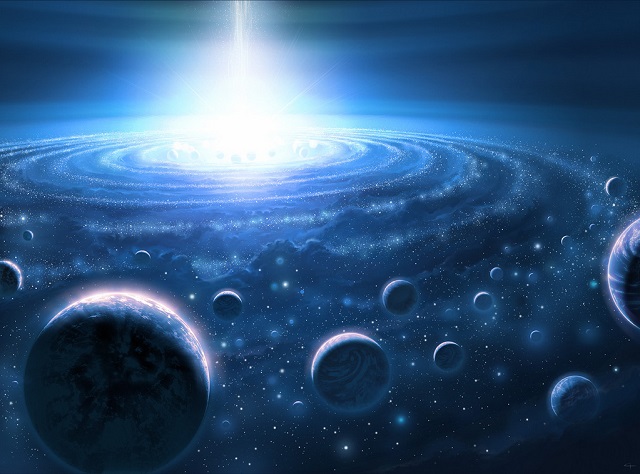By: Brian G. Chilton | March 21, 2018
Last week, notable physicist Stephen Hawking died. Hawking was known for his brilliant work as a physicist, especially working with black holes, the big bang, and for his exploration of the so-called Theory of Everything (a theory that is purported to hold the glue to the four major laws of the universe). In addition, Hawking was known for one additional thing: his atheism. This has led many people to inquire, “Why does it seem that so many notable scientists are atheists?” While I do not believe that all notable scientists are atheistic in their worldview, this does lead one to ask if there are any good reasons for believing in God’s existence.
While I do not claim to hold the brilliance of Hawking, I was one who was led into the mire of agnosticism earlier in life. Tampering with a theistic-leaning-agnosticism, I was open to the idea that God could exist, I only didn’t know if there were good reasons for accepting God’s existence. Furthermore, if God existed, I wasn’t sure that one could know that God was personable and that he could be known in any certain religion. While the latter questions are things I will cover in later articles, suffice it for now, one needs to ask, “Are there good reasons for believing in God?” Among other issues, five major arguments or evidences, if you will, led me to a strong belief in God’s existence. Counting down from the fifth to the first, the following are the issues that led me to become a strong theist.
#5: Moral Argument
If you really think deeply about it, isn’t is strange that the strongest proponents for social change and ethical behavior are those who do not hold to God’s existence? I am certainly not saying that Christians have not led for social change. Charles Spurgeon and John Wesley both vocally opposed slavery. Nevertheless, it is strange that atheists fight for social change because their worldview does not support objective morality. I am not saying that atheists cannot be good people. I have known many fantastic people who adhere to atheism. I am saying that atheism cannot sustain objective morality because if God does not exist, then all of humanity is nothing but random molecules in motion.
If morality is objective—that is, there are things that can be considered right and wrong, then there must be an objective lawgiver. In essence, I have described the moral argument. Think about a speed limit sign. You are driving down the road and you see a sign with the big numbers 35 on the white rectangular sign. You may not agree that the speed limit should be 35 miles-per-hour. Nevertheless, some lawgiver did. The sign did not magically appear. Rather, someone decided that the particular stretch of road upon which you are traveling should only maintain that speed. If there are morals, then someone must have set them in place. In addition, morality points to the importance of life. All of this is only true if God exists.
#4: Consciousness Argument (NDEs).
Consciousness argues for God’s existence, especially if the mind is shown to be separate from the body. That is, if there is an immaterial self (otherwise known as the soul), then spiritual entities exist. The mounting evidence in favor of near-death experiences (i.e., NDEs) demonstrates the reality of the spiritual self. While space does not allow for me to fully engage with this issue here, plenty of material is available which describes the reality of these experiences and how it demolishes the concept of materialism (i.e., the idea that only the physical world exists and nothing else). While NDEs do not necessarily prove the existence of God, it does show that the idea of the Holy Spirit, angels, demons, and the like are not as far-fetched as the skeptic might think.
#3: Design (or Teleological) Argument.
My dad used to have a saying that went, “If it looks like a duck, quacks like a duck, swims like a duck, and flies like a duck; then chances are likely that you are looking at a duck.” The more I learn about the universe, the more I understand how much intricate design the universe possesses. The universe is full of design. Everything from the way gravity and the universal forces operate[1] to the vastness of the universe itself[2] illustrate not only the design found in the universe, but that the universe was designed to support sentient beings like us. If something appears to be designed, then it is logical to infer that its design and structure came from a designer.
#2: Cosmological Argument.
The idea of causal relationship is at the center of science. That is, every effect must have an underlying cause. This is the heartbeat of science. Yet, this heartbeat seemingly flatlines with the atheist notion that the universe somehow spontaneously created itself. Cosmological arguments for God indicate that if the universe had a beginning, then it is rational to imply that a Creator brought forth creation into existence. For creation to bring itself into existence, creation must be considered to be a conscious self-existent thing. How so? Anytime a process of decisional action is placed upon a certain thing, that thing is anthropomorphized. That is to say, we make that thing alive. Evolutionists often do this with the process of evolution itself with claims like “Evolution decided this or that.” But, how can a mindless process decide anything?
William Lane Craig has popularized a brilliant argument called the kalam cosmological argument which goes as follows:
“1) Whatever begins to exist has a cause.
2) The universe began to exist.
3) Therefore, the universe has a cause.”[3]
“But, wait,” one may infer, “if there is a multiverse, doesn’t this get around the problem?” Unfortunately, for the materialist, the Borg-Vilenkin-Guth theorem “closed the door on that possibility.”[4] All physical universes, including a multiverse, must have a finite past, meaning that even a multiverse must have a beginning. Thus, one is left with one of two possibilities: either eternal non-existent nothingness (which means the absence of anything including vacuums) brought about something from nothing, or an eternal Someone brought something from nothing. For me, the latter is MUCH more intellectually satisfying.
#1: Information Argument
The last argument is not an official argument. Rather, it is something I call the information argument. It came to me that any process or program must contain information. Information requires a programmer. The universe contains programs and processes that require information. Therefore, the universe must have a Programmer—that is, God. I am not an evolutionist. Nevertheless, even if evolution were true, it seems to me that this process could not have created itself. How does mindless nothingness come up with anything anyhow? It is nothing and it is impersonal. So, how does mindless nothingness do anything? It can’t. Consider the information found in DNA, and the information found in the processes and programs of the universe. To claim that it came from nothing and no one and simply arranged itself would be like Luigi telling Mario that their virtual world needed no programmers. It is utterly absurd!
A cumulative case considering these five pieces of information and many more show—at least to my mind—the absolute necessity of God. I have to agree with Anselm of Canterbury in his 1078 work Proslogion that God is that which nothing greater can be conceived. How true!
Notes
[1] Norman L. Geisler and Frank Turek, I Don’t Have Enough Faith to Be an Atheist (Wheaton: Crossway, 2004), 98-110.
[2] Hugh Ross argues that even the vastness of the universe is important for two reasons: the production of life-essential elements and the rate of expansion. See Hugh Ross, Why the Universe is the Way It is (Grand Rapids: Baker, 2008), 33-34.
[3] William Lane Craig, Reasonable Faith: Christian Truth and Apologetics, 3rd ed (Wheaton: Crossway, 2008), 111.
[4] Ibid., 150.
About the Author
 Brian G. Chilton is the founder of BellatorChristi.com and is the host of The Bellator Christi Podcast. He received his Master of Divinity in Theology from Liberty University (with high distinction); his Bachelor of Science in Religious Studies and Philosophy from Gardner-Webb University (with honors); and received certification in Christian Apologetics from Biola University. Brian is currently in the Ph.D. program in Theology and Apologetics at Liberty University. Brian is full member of the International Society of Christian Apologetics and the Christian Apologetics Alliance. Brian has been in the ministry for over 15 years and serves as the pastor of Huntsville Baptist Church in Yadkinville, North Carolina.
Brian G. Chilton is the founder of BellatorChristi.com and is the host of The Bellator Christi Podcast. He received his Master of Divinity in Theology from Liberty University (with high distinction); his Bachelor of Science in Religious Studies and Philosophy from Gardner-Webb University (with honors); and received certification in Christian Apologetics from Biola University. Brian is currently in the Ph.D. program in Theology and Apologetics at Liberty University. Brian is full member of the International Society of Christian Apologetics and the Christian Apologetics Alliance. Brian has been in the ministry for over 15 years and serves as the pastor of Huntsville Baptist Church in Yadkinville, North Carolina.
© 2018. BellatorChristi.com.





